
|
|
|
july
8, 2013 (1) (0145US)
the epistle to Diognetus
|
|
Give
the good Book;
there is just one! (Rev of Arès iv/11)
Let's write the perpetual Book of Good!

Unknown
are the author of the epistle
as well as its adressee, a Diognetus.
This now well famed apology
for the Christian life in the ancient days was by chance discovered
in the 15th century by the customer of a fish
dealer who
had wrapped up bream and mackerel in it.
It might be written
between 170 and 220, but let’s make it as topical in 2013 as it was
then. Here is the passage of it which describes the Christians of
old.
The
Christians are
not different from the other men, they cannot be noted for their
countries, their languages, their clothings. They do not live in
cities of their own, they do not use special jargons, their way of
life is not unusual in any way. It is not thanks to imagination or
daydream that they have gained faith; they are no champions of any
ideology, so unlike many others. They live in the cities, whether
greek or barbarian, one way or another by accident of birth and they
follow the local customary clothing, feeding, in short living, while
signalling the principles of their spiritual republic.
So each
Christian lives in his or her birthplace but like a domiciled
foreigner, fulfills his or her citizenship duty, meets the service
charge. Every foreign country is a birthplace and every birthplace is
a foreign country to them. They get married and have children like
all men on earth, but they do not forsake their newborns. They share
the same table, but do not share the same bed.
They are in the
flesh, but they do not live according to the flesh. They live on
earth, but they are citizens of Heaven. They follow the law, but they
as searchers after Good overcome the law.
They love all men
and all men persecute them. They are undervalued, condemned, killed
and as victims they gain Life. They are poor, but
make a large
number of people rich. They are short of everything ; but are
crammed with the (Great) Whole. They are
contempted, but
their glory lies in that contempt. They are
slandered, but
they are justified. They are insulted, but they keep blessing. They
are offended, but they keep praising. They are just good people, but
are treated as villains. When punished thet are joyful like they were
born to Life. The Jews fight them, the Greeks
persecute them
and those who hate them cannot say why they do so.
To sum up, that
which the soul is in the body
the Christians are in the
world. The soul spreads throughout the body like
the
Christiane spread throughout the world. The soul
dwells in the
body although it does not belong to the body: likewise the Christians
dwell in the world but do not belong to the world. The invisible soul
is imprisoned in a visible body just as the Christian are in the
world, but their piety remains invisible. The flesh
hates the soul and is warring with it; the soul
does not harm
the flesh, but tempers its pleasures; likewise the
Christians
do not harm the world, but are opposed to the (unleashed) pleasures
there. The soul loves the flesh
which hates it, just as
the Christians love those who hate them. The soul,
which is
immortal, lives in a mortal tent: similarly the Christians pitch
their camp in the corruptible while expecting heavenly
incorruptibility. The soul depends upon penitence;
although the Christians are persecuted, they grow in number day by
day. God has assigned to them a position so noble that they cannot
desert it.
Substitute Christians
for Arès
Pilgrims and you will have a fine text instrumental of informing
anybody that asks what we Arès Pilgrims are... or should be.
This is, I think, a good
meditation in the Pilgrimage days.
 |
Comments
published
(0)
Add
a comment
|
|
23
may, 2013 (144US)
making
the unsacred sacred
|  The
world is worn-out. This is a cause of extensive difficulties in the
mission.
We
have been trying hard to have a sacred Call, that asks for
a brave commitment, listened to by men disappointed, unsacred, who have
not
committed themselves to anything unrelated to their private lives for
ages.
Not that they do not wonder about fundamental
questions, but these questions are never converted into action. They
refuse to push their hopes to the front, to set them out in the public
arena, to change their lives (Rev of Arès 30/11).
I
have constantly puzzled my head about all those men who
have worried more and more about their future, their children
and
grand-children's future, but are still practicing the art of
sidestepping.
The Westerner hides from his opponents:
Christian religion though it is dying, politics which is incapable, law
which
hampers life much more than it helps it along; he would rather submit
to them; he is afraid to break away from them overtly, buries
himself in unspoken resentments and in inertia.
What
sort of
security does man hope for in his faintheartedness? The security
completely wrecked in 1914-1918 and 1939-1945, and then wrecked again
more slowly, but still more deeply in the economic warfare
today? The man today is born of generations that lived through
ten
times as many disasters and hardships as their forefathers had ever lived
though in a century. I personally was born in 1929, but I realize that
my childhood world has completely vanished and left no mark. What's
more, I seem to live through my last years like a criminal in
front of men who regard me as a dangerous ideologist, while I am just
an initiator of saved free souls just as all of the messengers
of the Father have been.
The situation far from
making me hopeless makes me eager for the great turnaround that The
Revelation of Arès has told me it is feasible ever since
1974. Today I understand better then ever what the Father means by: The
Truth is, the world has to change (Rev of Arès 28/7). By why
has it been understood by very few people so far?
I
am even less desperate for my far-off youth now that I feel young. I
need this strength greatly, by the way. It is very
hard to make undecided, skeptical, despiritualized men decide to set
themselves free through spirituality. The Arès Pilgrims have taken up
the challenge to change
the world where nothing is steady anymore, and where all
is ambiguous and undetermined, a world going downhill to the sin
of sins (Rev of Arès 38/2). Very few people listen to us, too
true! but we are going forward stubbornly in search of absolute
freedom, which penitence
will give us. This we have perfectly understood and men
and women of the outside world will understand slowly, but certainly.
We
want a planet without passeports
(Rev of Arès 22/11), or any rat law (xix/24),
or any tribunal (16/13,
21/7) other than our consciences (God or Good
within us). We want love, forgiveness, intelligence
lightness against politics which makes life, communication, management
and "justice" more and more complicated and burdensome. The
governmental or administrative feet put on iron clodhoppers to make
man's neck bown down, force him to the destiny that they want for him.
Man pipes down, his resistance to the tamed animal's destiny they make
for him is almost nil; which goes beyond any rational explanation. The
reasons for their non-existent resistance, which people in the street
give, when they happen
to give some, are unclear. They all seem submitted and yet when they
are asked, "Are you submitted by civic-mindedness? " they do not
answer "Yes". They shake their heads doubtfully. You can guess that
they are repressed rebels, hangdogs which can't bite.
They
can't
bite, which is good because biting has turned useless. History has
shown it. But what if humans psychologically worn-out are
given a
different way of gaining happiness? They might have become cowards only
because they have become convinced of the permanent triumph of
political materialistic rationalism everywhere, whereas it on the
contrary is having its back to the wall where it is bound to fall
through, being unable to have mankind getting over it because it has
exhausted it by depriving it from all ideals. But there is an ideal
left, which we call on men to take up so that they may draw from it a
new strength to set themselves free, it is the ideal of The
Revelation of Arès.
This is why the darker the
politic economic prospects, the braver and more hopeful we have to be.
The
world still has good colors, hidden but alive. In the world each man
thinks he has to take side with or against the left, the right or the
center — "Vote!" the political propaganda shouts, even though what you
would rather vote for has never existed or has disappeared —. More and
more people realize that this citizenship pivilege chains them up and
that invisible strainers tighten the chains. The virtuosi of cynical
irony and of diffraction are at work, let us believe that the smaller
our space of freedom the nearer we are coming to the infinite and the
light. Which explains why there are more and more abstainer. The
inanity of
the speeches has never been that obvious. Our mission for the Truth has never
been that necessary to give men a sense of reality.
Penitence can give each man freedom.
So
we have to preach penitence relentlessly.
Let's explain again
and again what the Father means by penitence,
the key to resacralization and liberation.
 | Comments published
(0)
Add a comment
| |
|
24 april, 2013 (0143US)
illuminati
|
|
Central
banks douse the political financial system with liquid assets
to keep it afloat.
As there is no world war any more, arms dealers
now sell money. This could be a step in the right
direction.

From December,
2012, to April, 2013 I was surprised three times strongly and bitterly.
The
surprise told me that I had come into the telescopic field of vision of
underground aeons, who had begun regarding me as their enemy.
How could
a solitary
old man of God pose a threat to those secret forces. They now see him
as if he
had been changed from a minute worm (Rev
of Arès 2/10) into an open country
snake (28/13) which tells all of men the idea plain but
powerful that they
can set themselves free through penitence.
This is true, but you mysterious aeons please think! Penitence
is not a sthreat pénitence;
it is a path to salvation
which is open to you too.
I know who you underground aeons are. You act careful
about being unheard by
the masse; your voices, I don't know how, get up to your black
dogs on the surface, but the Father said that they are unable
to eat my heart in which His Marrow flows
(Rev of Arès xLiii/10-12). Therefore, I feel tranquil, albeit
I keep
watchful and not too clumsy with Aghel's help
(xxxi/13).
You are the illuminati!
You are trying to overpower me, not by scorn any longer — the Arès
Pilgrims
can't be accused of being a cult any longer, as their spiritual life is
free (Rev of Arès 10/10), they have
no
leader, no dogmas, no religious organization — but by other means which
are, say,
administrative, which I don't want to mention, because they are aimed
at me
personally.
You invisible dragons of the subsoils just be aware that I do not
deserve your
blows. I am not interested in setting the
prices of things and being dominant;
I am just a prophet of Good
That is longsuffering
(Rev of Arès 28/21-24) and the gap between you and I may
be not as wide as you think.
I do not believe the global "conspiracy theory", because I think that
there are rivalries among illuminati just as there are some everywhere
on earth,
but I believe the theory of conspiracies. Each
illuminati group is stronger than
the governments which think they rule its era. It urges them with money like donkeys with
carrots.
The illuminati are enemies of God no more or no less
than all of men are. Mammon (Luke 16/9-11)
or associated thirst of power and greed is
everywhere right at the bottom or right at the top. The Illuminati are children
of the Father (Rev
of Arès 13/5) just as the multitude
with hollow eyes are; they are my neigbor,
so that they are wrong to consider me as their enemy.
I pursue my line of thought further. I think that the illuminati,
like the Arès Pilgrims, want to be free
(10/10), but that they will set
themselves free from the powers —
politics, religion, law, the white king
and the black king — by endowinng them with money and so ruin
them through
debts, while we will free ourselves
through penitence. The illuminati,
another struggle for freedom. Wealth and poverty are a focus for
materialists. They
spend fortunes to break down both of them, but are unsuccessful.
Reality is a different
matter for spiritual people: The illumnati's wealth and our poverty may
be two
paths that converge on the same Heights.
But
what whatever does the tempter offer… that I (God) have not yet given
(Rev of
Arès 26/8-10).
Politics and governments would be nothing if they were
short of the
money from this obscure
force, the hard core of the aeons that are looking for absolute
freedom, but
that cannot gain it if they fail to add spiritual strength to their
material strength
by becoming men of Good. Some
of them can do so,.
You illuminati don't strike me any more! I am opposed to nobody. I am free
from all prjudices.
O illuminati you are strong and I am nothing today, but the Word
achieved is
going to change the world (Rev of Arès
28/7). Please line up with
me. (Indian
Wisdom) :
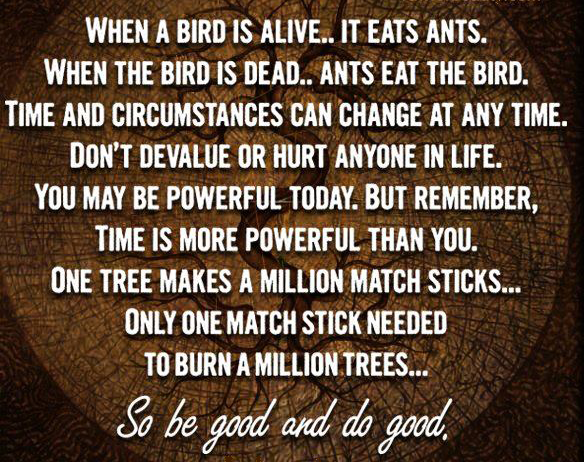
 |
Comments
published
(0)
Add
a comment
|
|
march 28, 2013 (0142us)
the
ideal's apostle
| Luke:
"I can't believe it."
Ioda: "This is why you've failed."
 The man or woman in the doorway, whose head and
heart hold The Revelation
of Arès, and who besides may be a penitent in his life and who
has a soul therefore,
but who hesitates to take the plunge, I tell,
"Be an apostle! Make Good
happen;
you've got the power to do so!"
Penitence
builds
your soul, the vessel
(Rev of Arès 17/5) of Life, but do
not leave it drifting on the Sea; give
it a sail.
A penitent who does not harvest
is
a vessel without
a sail. The soul which
does not sail about cannot generate other souls; it
gets inlaid with the shellfish and seaweeds of fear and ends up a raft.
Give
up everything! Give up fear and uncertainties; leave your affairs, your
housework, your dishes, your odd-jobs, the letter you are writing, the
book you are reading, your worries. Leave your day-to-day existence!
Just be off for an hour, two hours, often, very often, and go n'
encounter people in the street; explain to them — in a way that becomes
you — that they are not just made of bone and flesh driven by politics,
religion and their law like dogs on a leash.
Tell
each human
you meet up that he or she is the image
and likeness of
a sublime Ideal, Whose child he or
she is… The
fatherless child, because
he or she has killed the Father Ideal
in his or her heart. The Father Ideal
however has left him or her the power to (re)create himself or herself,
but whether he or she does it or not is another matter. Neither
religion nor politics will do it for him or her. Tell him: "Loosen up!
You have to be absolutely free to find the Ideal—the Father, the
Eternal, the Maker, Life, Happiness, Love, call It what you want!"
Tell
humans, "There's nothing shameful about a heart hungry for that Ideal of Sanctity,
Might and Light (Rev of Arès 12/4). You
will regain Them by changing
your own life (30/11). Be
a penitent, that
is, love,
forgive, make peace, vitalize your heart's intelligence, set
yourself free from
all prejudices and harvest other penitents! So not
only will you find your salvation, but you
will help to change
the world (28/7)."
Do you regard
yourself as a
clumsy oaf? We all are. You do not know how to love the world and
speak to it with affection. But there is no compulsary exercise to love
and "no matter how clumsily I hug provided I can kiss!" said young
Albert Camus, who thought he was an unbeliever, but was unknowingly
going to appeal for penitence until
he died.
Humans cling on to the only
ideology they have left : the State, the law, science, and
religion for a few, because they have lost the Hand
and Voice of the
Ideal Sanctified,
Mighty and
dressed with Light,
they have let Them go and all they can do now is bark and meow along with
religion, politics, the law. They do not have had anything else left, they
think. They are wrong. They have the Ideal back to speak to
them in Arès on the French shore of the Atlantic.
Arès
is a place miles from
anywhere and the witness there is reviled and unkown. But this actually
authenticates the
Ideal. Why would He come down back to those who have forsaken Him,
made themselves magnificient and granted themseles the power to
destroy, because they are unable to build? Even those who mention God
do nothing but dress with flashy golden rags the dominations
which,
people imagine, settle the world's destiny from the Élysée, the White
House, the Reichstag, the Kremlin, the Vatican, Mekka, etc., while the
world's destiny is just settled by the work of men and of their hearts
pounding in their chests, and will be just settled by the souls
born to Good tomorrow.
To
those who retort to me, "But the State and the media ignore you," I
reply, "True, indeed, but do they say anything about you?" "Nothing"
"This is some confirmation that we are dead right in ignoring them. We
are the masters of the future. To
be ignored by the powers is the best condition to beat them. The
media are different. They'll get used to living with us some day."
Oh!
we know that the streets are filled
with rational people and groundhogs anesthetized by the rational
people, the crowd uninterested in the Ideal, all those who consider
faith as
just dreamy or laughable, and who
are too busy finding faults in everything and everybody to see wihin
themselves the image
and likeness of
the Ideal they are born of. All the more reason for speaking
to them without failing (Rev of Arès 26/15). Don't
you regret failing to be an apostle?
A
propagandist peddles an idea and calls on people to follow it. You are
not a propagandist. You do not prompt people to follow anything, but to
create themselves. Sprout what has been sowed
(Rév of Arès 5/1) within
humans by the Ideal Creator! This is a noble fruitful job. Remind
humans that the Creation is hid within them and comes out as a soul,a
ha again,
if they live according to Good, and
that the ha is a
constituent of the polone, the
world's soul (Rev of Arès xxxix/5-13), which
can reform then. An idea makes a people a pack. Do
the opposite by awakening the ha through penitence!
Set
each human free from the pack. So the human regains his or her self,
the self
becomes Life,
Happiness, Eternity (Rev of Arès 24/8, 36/23). We
gather together in an assembly, but
not to make up a crowd religious or political. We do so to help one
another to find Life (24/5),
which is not imposed on everybody under a dogma, an ideology, a law.
Each human is a God asleep whom the apostle awakes.
Just
be an apostle!
 |
Published comments (0)
Add a comment
| |
|
8 march, 2013 (0141US)
disparity of exposition
|
Some
day our microbic hearts will conquer
the enormous amoebas of
the system
 While I was in
Paris doing missionary
work with a
group of youth, I from my Kindle by night read a small book by Daniel
Cohn-Bendit: "Should we Eradicate Political Parties?!" Cohn Bendit is a
libertarian, so he does not come under any party. Would he be in line
with my entry 135 "The political cancer"? At least he has succeeded in
a career which few men carry out successfully: Being be a Member of
Parliament in a system where all parties and lobbies engross all the
means of communication. He has only found an unknown publisher of
Montpellier (France), "Indigène", for his "Should we Eradicate
Political Parties?!" But he has found a publisher! I personally had
found no publisher, at all, among 47 of those with whom I had come into
contact to publish The Revelation of Arès. While I was in
Paris doing missionary
work with a
group of youth, I from my Kindle by night read a small book by Daniel
Cohn-Bendit: "Should we Eradicate Political Parties?!" Cohn Bendit is a
libertarian, so he does not come under any party. Would he be in line
with my entry 135 "The political cancer"? At least he has succeeded in
a career which few men carry out successfully: Being be a Member of
Parliament in a system where all parties and lobbies engross all the
means of communication. He has only found an unknown publisher of
Montpellier (France), "Indigène", for his "Should we Eradicate
Political Parties?!" But he has found a publisher! I personally had
found no publisher, at all, among 47 of those with whom I had come into
contact to publish The Revelation of Arès.
The media are utterly
uninterested in our mission.
The disparity in exposition is titanic.
Cohn-Bendit shares ecological ideas. So his thinking, which he claims
is free, sees only a narrowed down part of human horizons. This tells
the difference between his political concept of freedom and the
absolute concept of freedom in The Revelation
of Arès (10/10). I consider the word ecological as woolly and
even corrupted like the word christian. The ecological produce of my penitence, considering what I mean by
ecology, is my soul regarded as
the image and likeness of God
within me. God… This just goes to show that the human horizons I can
see are so much large and complete (Rev of
Arès 17/7) that they are not nameable.
In them I first can see our fantastic spiritual potential, the soul. The soul
has been born out of a very small number, but is still
fœtal in the vast masses. The soul however
is the only trigger of upper human potentialities intellectual (mind) and physiological (flesh)
as well as spiritual (soul), which
raise good, love, happiness so much
higher than the ecological social law, but no one gives my soul the media to proclaim this to the
world, even in a penny-pinching way.
Before I read Cohn-Bendit's small book I had already intented to go
about inequalitty in exposition in my blog and remind the world that
there is much less inequality between the rich and the poor than
between those who have all means of being heard and those who are
silenced.
I do not judge men, I judge the system, the big badly made grinder,
that has made men what they have turned into.
The
system, whether capitalist, socialist or ecologic, through numberless
speeches, books, articles and
theses weighs economy according
to the GDP, but the GDP is just interested in the priced market and
ignores humans. The GDP never works out the inequality in chances of
being
successful or the inequality in chances of entering into
dialog with society. Now, there is no economy without offer or demand,
without dialogs therefore. The only ecological difference between a
windmill offered to change energy generation and penitence offered
to change life (Rev of
Arès 30/11) is that the former is very costly and the
latter is altogether free, but both of them are generators, of energy
by one, of good
by the other one.
What's more, penitence
when it spreads will
result in economical effects far beyond all that economy professors
teach. It doesn't matter to us what Mr Hollande and
Mr Ayrault's "socialism of supply" or "competitive deflation"
(strange clichés), of which 9,998
Frenchmen out of 10,000 do not have the slightest idea? They are
leading us to more taxes and more poverty, while we Arès Pilgrims have
something else to put forward, somethings else, which doesn't cost a
penny, something more clever than the stupid system which has been
stifling us so far and they forbid us to use the wonderful means of
spreading ideas: Publishing, radio, television, etc. so that we cannot
suggest it to the world. We have nothing but the street to convey our
message, if that! When the police do not drive us off! Is this equality?
The "Liberté, Égalité, Fraternité" (Freedom, Equality, Fraternity) on
the French townhall facades are just wishful thinking. When just a tiny
part of a population is in control of media, think tanks, reseach
funds (None of CNRS researchers has rung my doorbell ever for 39
years), etc., we live in full inequality. Even the equality of our
election system is a fake: Just look at the pie chart of the
proportional distribution of votes and abstentions in the 2012
president election in my answer 130C83 and you can see
that our current government is based on no more than a quarter of the
French electorate.
Our role is first of all to change life (Rev
of Arès 30/11) through penitence
and then, when there are enough penitents,
change the world (28/7), that is, change
the system to start with and get rid of it subsequently in order to
live in a quite different society. This was the Gospel's plan in Jesus'
days and it is still our plan today. But
Jesus was not a politician. Cohn-Bendit,
even though he declares himself to be free, has entered politics. Can
we avoid entering it? If we can't avoid entering politics, to what
extent and how can we do so without going back on our faith? It's
impossible without "decolonizing our imagination", as Paul Ariès says,
because our Arès Pilgrims thinking is colonizined by the current
political manners, which do not fit in our faith. We have to devise a
new way of entering politics to alter the balance in power which
currently promotes the mighty and the media, so that we may enter into
free negociations with the world.
The system suppresses any public exposition of love of the neighbor,
all that can bring new empathy between man and his spiritual sources.
On Sunday, the system grants a television morning to the great
religions, if that! Only if they are respectful towards the system. How
can we show the Right Path to
mankind, if not in the street? I never stop thinking of the problem of
inequality or disparity, because we honest and qualified people have
been reduced to a sort of spiritual begging so far.
But we will conquer the inequality of exposition to expose the Word that will save mankind in a voice
that will beat the earth (Rév of Arès xLv/14).

|
Published
comments (0)
Add a comment
|
|
february
5, 2013 (0140us)
happiness
| 
In The
Revelation of
Arès the word happiness
is rare.
Actually, happiness
is
everywhere in it.
It is the invisible air that its reader
breathes.
Just as the
universe is in an astronomical telescope, happiness is the
Great Whole
to which
the Word brings us.
Why change the
world
(Rev of Arès 28/7), if the action does not end up at happiness?
Happiness
is
the Reason
why our faith is active.
The word happy is still rarer in The Revelation of Arès. At the verse
(28/15-22) it
describes one and the same type of believer, the man or woman who keeps
on
unfailingly with penitence under
the
hard circumstances, which the beatitudes mention: scandal, poverty,
servitude, hunger
and injustice, whilst retaining virtue, love, peace, generosity at
sharing.
At the verse (9/6) happiness means
intimate
bless
between husband and wife; at (37/9)
it
means happiness kept in
grief ; at
(xxvi/12) it means happiness kept
in
hardships.
It is just at the verse (36/23) that happiness
has an absolute meaning: Happiness
is
not weighed in time, but in eternity. That is the whole
point; there is no
need of development. Absolute eternal happiness
was what I was thinking of when entitling this entry happiness.
The world has continuously used the word happiness
since time immemorial in all possible forms, even extreme ones. The
Frenchtelevision channel M6 presented a show called "I’ve decided
that I’ll be
happy" on January 31 and told that they would soon present
another show
called "Happiness can be learned." Not
prostitution, but happiness
trading in my opinion is the oldest job in the world.
Modern philosopher Vincent Cespedes, the author of "I love
you, another love
policy" protests against the "happinessism
wranglers" ;
he actually does not do anything but be akin to all those who for
millennia have
claimed that happiness is just a question of training or formulae, or
of escape
from realities, or a matter of elation or euphoria.
Another
modern
philosopher Pascal
Bruckner writes in an antinomical way, "I love life too much, so I
don’t want to
be happy," which does not mean anything, but permits him to publish a
maxim
which makes him different. In short, people on earth can only talk
through their
hats of happiness either relative or momentary.
We Arès Pilgrims do not refuse to accept times of happiness in our
earthly
lives, but we aim to absolute eternal happiness
in its beginnings which the joyful
festive times of penitence
give
us (Rev of Arès 30/10-11), thereby
we
puzzle those who can see happiness only as momentary exhilarations or
raptures unrelated
to penitence, which they see as
something sad while we see it as joyful.
As penitence
makes us happy, we have been somewhere else
already.
We know that the path
upwards
to
absolute happiness is not the way
of
the seekers after earthly happiness. Actually, we accept earthly
happiness as
well as absolute happiness, but we do not mistake one for another.
We are aware that absolute happines, that
which Adam lived through in the Garden of Eden, is
not weighed in time but in eternity (Rev of Arès 36/23), it
is Life totally free from worries,
diseases, aging and death.
Life beyond
life.
 | Comments
published
(0)
Add a comment
|
|
17
january 2013
(0139US)
happy new year, my neighbor!
| The
man that saves me from the fire has no face,
no citizenship, no religion. He's my savior.
So it is that I have to see my neighbor.

Happy new year, neighbor!
Who is my neighbor?
This is seemingly simple, my neighbor is the other one.
Yes, but otherness is so infinite that it is impenetrable!
Who on earth is the other one?
When I
look at the other one throughout the world and under all possible
circumstances, I see he is so
various, infinite or indefinite in every respect, that I catch
myself seeing a large number of others and doubting if each of them is
my
neighbor.
In
1492, the year Christopger Columbus discovers
America the dwellers of which, Caribbeans and Rad Indians, we Europeans
are going to slaughter, Isabella of Castile expels the Jews
from Spain. A Caribbean, or a Red Indian, or a Jew is not the
neighbor
of an European.
Twenty-one
years later, in 1517, Martin Luther founds Protestantism. The Catholic
and the Reformed are going to kill or harm each other for centuries. A
Protestant is not a Catholic's neighbor and so conversely.
Even
once resigned to different religions, Europeans do not experience love:
All in all they're interested in the other one not much apart from
destroying him, which was done only 100 years: World War 1, 70 years:
Auschwitz, or 25 years: the Gulag, etc. ago. Little time actually,
almùost nothing on a historic scale.
For instance, Mr
Sarkozy yesterday or Mr. Hollande today. Is he my neighbor, since I am
assailed with an irrational apprehension whenever I think of him? Quite
frankly I have doubts not about the Evangelical principle, but about my
real knowledge of what my neighbor is whenever I think of a man to whom
I as a man of God means less than his dog. I have to learn much about
what the other one is to me.
Otherness is still nothing but the
withdrawal of each man, to his self, his family, his village, his
ideas, simply to exist, since he does not exist for the other one.
Oh! We have not been short of humanists to call on us to love, from
Jesus to Erasmus and Albert Camus… in books.
But in reality I am unsure if things are better.
Things
are better but just seemingly. The other one takes up my job, he puts
his durty feet on the seats of my train or bus, he takes my family
allowance and my national health and pensions money. The "witches of my
neighborhood", as Montaigne
said, are still there with their veils on their heads, or bubus, or
gossiping tongues.
To think that lots
of people are interested in
their dogs, their cats or in extraterrestrial aliens before they are
interested in their neighbor.
All things
considered, the neighbor is still someone to be created in my mind.
So
it is highly appropriate to wish my neighbor to be born within me by
the day in 2013 and wish my mission to be unfailingly spreading two
concomitant ideas: Man has to be
penitent, that is, to
love, forgive, make peace, look for spiritual intelligence and freedom,
and penitents
have to look for other penitents
and so on, ceaseless series of penitents
looking for penitents in the course
of the generations coming.
This is the fundamental Message of The
Revelation of Arès.
Work will not be in short supply for my old years.
 | Comments
published
(0)
Add
a comment
|
|
december
28, 2012 (0138us)
happy new year, celine!
| Celine cleans the turnet in May, 2010
(a snap by Sister Christiane during
the
spring cleaning of Arès's Holy Place)
 Sister
Celine, you have just entered the pantheon already large where all the
brothers
and sisters gone there ahead of us are now.
It is in the middle of them
that I
say my night prayer. I knee down and call them:, “Come n’ stand around
me! Come,
Alphonsine, Eugénie, the Pierres, the Claudes, Michel, the Bernards,
etc. !
(a flood of names). Let’s pray together!"
This I told into
the microphone
yesterday 27 December in Montussan crematory to all of those present to
say their
farewells to you Céline, while I reversely told you hello, because I
will say a
lot of hellos to you from now on. I saw the eyes of the incredulous, a
lot of
them, stare at me as if I was some retarded man, then.
I
had not fixed any speech.
Back from a mission trip four hours before I
was
only just able to say what I lived through and thought of.
I did not
speak like
a religious person or like a very proper necrologist of the 21th
century, but
like an Arès Pilgrim, like someone most of the audience was quite new
to.
Céline,
your family and relations, your friends and your colleagues understood
that I
believed neither in the paradise nor in the hell, but that the world of
the
living and the dead is all one to me, because we all are in a state of
transition, either living people going to die or dead people waiting
for life to
get back on the Day when Good
is triumphant, and because what
splits
us is thin, just a plain veil of invisibility between the flesh and the
infinite expanses of the universe.
Beloved and highly regarded Céline, on a one hand I
understand your
husband’ sorrow,
because I easily imagine my own sorrow if I lost my wife
Christiane.
On the other hand I cannot do
mortification (Rev of Arès 33/32-34) for you especially,
because I have done
mortification by now, constantly, for all of my late
brothers and
sisters.
As I am forced to work till my dying breath, as a missionnary,
letter-writer,
blogger, manager and so on, I cannot eat less than I eat, sleep less
than I
sleep, in short, act more unaffected and more mortifying than I do. So
my
personal mortification
is my night prayer, which I from now on am going to say with you,
Celine, on
top of Catherine, Maximin, Sylvie, Reine, Raoul, Maurice, Armand,
Caroline,
etc. (a
flood of names).
But
among the deceased, whom I can’t mention all, because they have been
too many of
them since 1974, you are going to play a large part in my mind. Your penitence,
your mission, your devotion
to
achieving The Revelation of Arès
were
more appreciable to me, because you were closer to me, so that in my
eyes
limited, partial, unfair, which can’t see all of those who are as good
as you
or better than you, you were more remarkable, a pet…
You were at work to
restore Life (Rev of Arès 24/5), just as every Arès Pilgrim
does, and you are carrying on the task of restoring
Life, because Life is a
concern
for you where you are now as much as It is for us here below
So, Happy New Year, Céline, in your new dwelling!
Let’s
work together !
Let
the Father of the universe give you
a
bit of his Power and Light (Rev of Arès
12/4) to help us in
the task which we are achieving
with
many difficulties amid the darkness of the world, which, had we
observed it
well, we could see looking like a tomb because of sin. We Celine and we
humans are
really not far from each other.
 | Comments
published
(0)
Add a comment
|
|
december
1st, 2012 (0137us)
mary
| God mourns prophet Jesus murdered.
But God can't be shown.
He can only show his Sadness
(13/5) by mixing
his unseen Tear (xxviii/17) and Mary's visible tears.
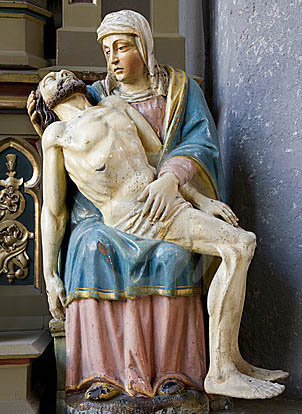 “May
I pray to Mary? ” some ask me ?
I reply, “Yes, you may. The Revelation of Arès says
so.”
“Therefore, Mary exists and can answer a prayer?”
I reply, “No, she
doen’t
exist. ”
Some inquirers glance at me, as if I were mentally disturbed.
Then, I explain: When I was given The
Revelation of Arès I was a cleric of the orthodox church,
which is Marian
like the catholic church. My Marian culture, which the daily meeting of
my eyes
with the word Mary in The Revelation of
Arès (9/6, 11/2, 12/12, 30/5,
32/2, 37/6) used to fossilize in my very poor thoughts took
years to vanish.
My mind kept God masculine and it was all because I had believed before
1974 that
God incarnate was male Jesus ; God as a male, therefore split
off
from Mary, a
female. What’s more, the name of a prophet’s
mother, to me then the Word’s mother
(Rev
of Arès 11/2), which the Wise one
aware of my cultural detention and the time needed to free myself from
it, used
to name His fondness and pity size.
Since time immemorial, because of the huge
weaknesses (Rev of Arès 36/5) into which Adam
(2/1-5) had thrown mankind, the Creator had told His Father
side by naming Himself God, Yahweh
or Allah, Brahma, etc., from His Mother
side by naming Himself Mary or
otherwise, so He used to present Earth’s children
(33/9) with a reality they could only find unintelligible:
God is not sexed!
It took me twenty-five years to feel Him as the All Other, altogether
feel Him
as the infinite Being, whose spiritual image
and likeness (Genesis 1/26-27) I had,
but whose nature identity I did not have, at all.
Even today my mind cannot, but like an axiom way too highbrow to be
expressible, imagine a Supreme Being who is far beyond Father
and Mother. A
Being admittedly material as the Maker of matter, I cannot conceive His
substance
and way of functioning, because He can both narrow to the size of a big
nail (Rev of Arès ii/21) and
He more
than huge, infinite, can continuously create an infinite universe (xxii/12).
How and why is that Sanctity, Might and Light
(Rev of Arès 12/4) interested in humanity, a minute fluff of
dust under His
or Her boundless bed, and in me or you less than infinitesimal and so
much numbed
by sin that it takes us twenty-five
years to understand that He or She can be Lord
and Mary at the same time? I do
not
know, but that’s how reality is and, what’s more, He or She couldn’t
care less
about your way of praying (Rév d’Arès
,25/6), provided you are penitents.
Performing the real piety is not
glorifying and not beseeching, but it is achieving
(Rev of Arès 35/6). You are not forbidden to glorify and
beseech nevertheless.
If you beseech—which irresistibly is only humain in extreme pain or
worry
days—turn to the Mother’s or Mary’s side
rather than the Father’s
side, but never forget that humans has besought for millennia almost
unsuccessfully, because the small remnant
of penitents (24/1, 26/1)
capable
of forging the link between souls
and
Heaven, which The Revelation of Arès
calls
polone (Rev of Arès xxxix/12-13) —something
like a collective soul, another thing that we cannot conceive yet.
As to me, I stopped praying to Mary
years ago, when I grasped that there was one Strength
of Good only, whatever
offshoots It might have. I take no more than great care to do
penitence, harvest
and
utter the Word to achieve it,
but I
understand that some people need the motherly side of God to feel
cherished and
protected.
A few worshippers of Mary ask me, on a distrustful tone, “Had Mary
never
existed, who might be the Mary that appeared in Lourdes, La Salette;
etc?”This
is the Mary, I reply, who likewise appears in Orthodox countries (but
it’s the
real one then, but not the fishy peaky Catholic ghost that showed in
Lourdes).
This is the one known as Fatimah, Muhammad’s daughter, who appears in
Muslim
countries. This is the one who appears in India and who is called Kali,
Devi,
Usha, etc. a whole slew of goddesses. In short, this is the apparition
of everywhere
in the world under myriad names, only because we biological beings are
not the
only living and that the invisible life all around manifests itself
sometimes,
but that goes for it just as that goes for Mary, man wants to shut in
the
apparition—nothing but non-physical life—in a closet and put a name on
the
door.
 | Comments
published
(0)
Add a comment
|
|
november
3, 2012 (0136US)
love
|

O
young brothers and sisters,
remember my
lesson
of October 21st : You are no propagandists, but apostles. The harvest
is a sacred action. You have to
make yourselves sacred through prayer, because it is The
Revelation of Arès that you achieve
and ask people to achieve.
You
are
the Light (Matthew 5/16, Rev of Arès
xxii/7) and here I add that you
are love. Love
is the essential flower of the sacred. Evangelical love.
French, what a poor language! Only a word: amour, and its verb aimer
not only
to mean propensity, attraction, choice, craving, passion, which are
just
contingent or possible, but also the will to identify oneself with
others,
which evangelical love
is.
Whenever I love
evangelically I from a sense of duty and for my salvation want
to identify myself with my neighbor, whoever. The word "whoever" points
out that I by loving become integrated into whole mankind, I find it
within
myself. I have the comprehension, the patience, the will to listen and
the compassion which
I have had towards myself : You
shall love your neighbor as yourself (Leviticus 19/34).
But here's the difficulty: Evangelical
love is intentional and voluntary unlike other kinds of
love, emotional,
romantic, parental, filial, carnal, which you can't choose or
experience to
order. This is why evangelical love,
love for all
of humans, including those who have the pus,
the worm, the hook on their
lips (Rev of Arès xxii/8), is an act of penitence, a willful
act, existential
if ever there was one, like the forgiveness of all trespasses, like
peace, like
spiritual intelligence (32/5) as a
counterbalance of intellectual intelligence, like the absolute freedom
of the
man free (10/10) from all
prejudices
and fears.
To love evangelically is to love absolutely therefore, just as the
Father loves
absolutely, so that He calls Himself excessively
loving Father (Rev of Arès 12/7), because He loves
very much more than what man commonly calls to love. The
Father loves absolutely just as He
is
absolutely free from all prejudices
and fears, just as His image and
likeness, man, has to make himself free.
We can easily infer from this that none of us will achieve
ideal love until
a lot of generations have gone by, but from now onwards we will make a
maximum
effort to love.
As things stand at present any human capable of
evangelical
love is to be
snubbed by the wicked and the stupid, but he or she will have an
enormous
advantage, unseen at the time but real in the absolute: He or she will
never meet
oblivion, whether God's Oblivion or men's oblivion, whatever contempt
he or she
will be held in by rationalists, who will spread the subtle poison of
nasty
rumors over his or her footsteps. For all that the Assembly will not
make him
or her a pious picture or a myth; it makes him only a worker of the
universal Salvation. The human that
loves
evangelically extricates from the night and dust of millennia strengths
which
cynical mankind cannot see, but which are capable of re-creating the
world. Evangelical love is always a
reference point.
The excessively loving human in
the
image of the excessively loving Father puts
things right in the schizophrenic
world, makes the impossible unity possible, builds up the being diluted
with
the system of Adam (Rév d'Arès 2/1-5),
wards off the curse upon the Babel cities and the Behemoth nations
which
stifles the remaining small human units, refutes the lies that have
spread all
over the earth. The human that loves
commits himself or herself with all his or her mind, soul, flesh and
blood
in this world's existence to make it again? There will be no
re-creation of the
world without love!
Against the uncertainty and short-livedness of
the world the excessively loving human sets the
image
unseen but forever live, impregnable, indissoluble in his depths of the
garden to be restored: Eden. Only love
will be able to weave the mankind's
bonds now slackened or undone. It is this repairing that is called Salvation,
because loving
is binding anew, reuniting.
oh the loving one does
not miss
anything of his soul's anxiety and
unappeased conflicts, his inner coolnesses,
but he can
overcome them; love enables him to
find to a greater
(in this generation) or lesser (in the next generations) degree that
vital energy
that is going to recreate Earth. All has to be sewn up between humans
and love provides him with the
thread and
needle. The thread snaps often, but the loving
one had begun the slow existential rebuilding of the world . He becomes
the loving hero (Rev of Arès xxxv/4-12).
Love wears out the crusaders' hawkish pride, it substitutes
the Creator's Arm for man's arm: a feeble
arm (Rev of Arès 33/20), a moumia's arm (mummy's,
xLix/7), the Black one's arm (xviii/11), the
drooping
arm (xxvii/5), the wicked's arm (36/13), the
crucified one's arm (xxxi/2); the through love the sword that
kills turns
into the sword that creates (35/14).
Love, the flower of the sacred, an
eternal rose all along the path to the
Saint's Heights will permit us to find the lost
Garden. Does anything else than love permit us to build up
plans
to change the world, revisit the
lost
Eden?
Only love is going to
reinforce
the sacred and blow evil down. Love of
the neigbor, of the one with whom we identify ourselves,
whether he is a friend or a foe (Matthew
5/43), feeling within
ourselves his joys and his pains, only love gives us a premonition of
our own
existence. Nothing is stronger than love to give us consistency and
strength.
 | Commentaires
existants
(0)
Ajouter
un commentaire
|
|
september
28, 2012 (0135us)
politics's a cancer
| "We
all will be ruined in 10
years..."
Jacques Attali (2012)
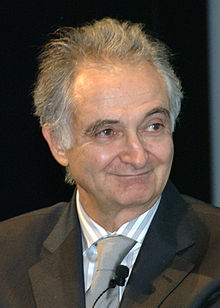 Competent
management, yes! Politics, no!
Amid all that malfunctions in this country just take the national
debt!
On
April 4th, 2006, my entry 16 was about it: 1,140 billion Euros.
On
April 4th, 2012,
only six years later, the national debt jumps to 1,791 billion.
But how had
they ruled the country until President Giscard d’Estaing to do without
a
national debt? Although it was a black
king, unjust, partisan and profiteering, politics had
nevertheless been a
reasonable
manager until then.
Ever since then, politics has badly run the country. While claiming to
get it
out of the free-market nightmare, politics has turned into a financial
cancer
that
consumes society.
When the Left took power after Mr. Mitterrand’s election,
1981, I greeted
it, but from 1988 on I stopped voting for the Left for the first time
in my
life. I had just understood that ideology without competent men was
worse than
the bourgeois spirit. I had just understood that the Soviet bloc was
going to
collapse because of a 70-year poor management, and that Mauroy, Fabius,
Rocard had
also been poor premiers, who had ruled in ignorance of real society
specific to
ideologists and through the debt. The Right back to take power found
out that
the French were not at all conscious of the debt and ignorance, became
unscrupulous and extended the damage.
And these bad managers, left-wing
or
right-wing, are not required to answer the nation that they have
overwhelmed
with a huge debt. A debt that cannot be repaid without taking a tragic
turn: Pillage
of the wealthy and savers? Inflation? Stock market crash? In short, a
ruin? Those
sort of
bloodless war… which after the 1914-1918 and 1939-1945 wars will be a
new negative
legacy of politics.
Can’t anybody see why the princes
of
the political religion like those
of
the religious religion, the black king like the
white king, are regarded as evildoers in The
Revelation of Arès (xxxvii/14)?
Can men live without politics? Yes, they can.
This is why the Father has
given his Revelation in Arès again, so that men can see through
It what they cannot see through speeches and media.
To cut the issue
short
let’s say that there is an unstoppable reality on which the whole world
and
politics live, which continually reemerges and which has exhausted all
the
ideologies that have sought to delete it. It is the firm.
No thriving
firm can
ever been born of the people or of politics. A firm is born of an
entrepreneur,
a rare valuable captain of industry, even if he or she is execrated.
The people
or politicians’ will has nothing to do with a firm and entrepreneur’s
appearance,
and yet firms and entrepreneurs are the nourishing fund of society.
This is why
Jesus often
compared the Creator to an entrepreneur — Parables of the talents, the
Workers
in the vineyard, etc.
We all, politicians included, live on the entrepreneur, who knows how
to
manage. Let him manage, then and be answerable!
It remains that we have
to spiritualize
him, make him conscious that he can be worth a fortune like Job, but
that he
like Job is an earthly mirror of the Creator’s Love.
Only two relationships between employers and employees are workable:
Whether it
is the never-ending struggle through the trade unions channels or love.
The Word says
that love,
which means quite new relationships, is possible between all of men,
between the
people and the firms that employ them therefore. The relationship that
communism has implimented: The mandatory consent through law and
suppression has
shown its horror and inability; it is not workable. Society has to find
like a
termites’ nest a conscience of its own, which goes beyond the sum of
all consciences, a soul that The
Revelation of Arès calls polon
(xxxix/12-13).
All this can be made but in small human units after
the big structures
and frontiers
have been dismembered. The big nations are to be reduced sooner or
later,
because they are becoming unmanageable, geneses of dictatorships,
godsends for
politics which enables any man mediocre but filled with cheek and all
guns
blazing can shine. Dwarfing the social groups may be the only way men
will find
to cut and pass through the mesh of a crisis soon inextricable and flee
from it.
To those who tell me, “What can we poor individuals, who have entered unto penitence (8/6, 31/12, 33/13), do
against the monsters which the great nations, their great politics and
administrations are except meekly die of the cancer they infect us
with?” I
reply,
As far as sociology is concerned man never makes up anything. All is
potentially in existence in the Creation. The delicate point is the
time of revival of Good.
The Father has chosen His time. Just as He chose the time when the
Romans or
Greeks would soon be susceptible to the Sermon
on the Mount to express it through Jesus’ lips, and just as
He chose the
time when the Arabian paganism was weakening to issue the Quran through
Muhammad’s lips, he chose in 1974 and 1977 the time when a world crisis
was
getting under way imperceptibly to be listened to by a small
remnant (Rev of Arès 24/1, 26/1) of men and women capable of
starting the
heavy process of changing the world (Rev
of Arès 28/7).
The future is near when men are ready to think of
a
reasoned reformation,
which can only be made through what The
Revelation of Arès calls penitence.
 | Comments
published
(0)
Add a comment
|
|
september
1st, 2012 (0134us)
prospect
| The
volcano of Good, that will
substitute for
the volcano of
lava, is in your heart as yet
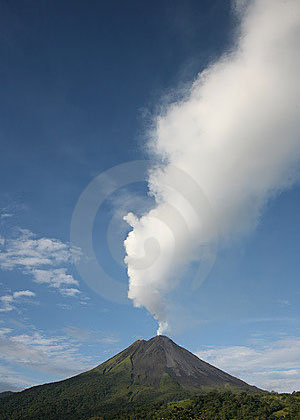 The Revelation of Arès
concludes by saying : The Revelation of Arès
concludes by saying :
I wash your heart (and) you wash the
brother's heart.
The Iron, you are its edge.
I breathe, your hair (falls out like) the rock of fire flow, it covers
the
earth,
it opens the gate (to the world like) the rock of fire (opens the
volcano, the
gate to the earth) (L/1-6).
These words mingle the present and the future,
because the present brother,
as a
penitent and harvester,
works
out the future; he is the future.
The
changed world (Rev of Arès 28/7), the
Garden (ii/18, xxviii/21) of Eden, is certainly the extreme
future, that of
the Day when time stops, but it
already has a potential existence in the present penitence.
Before then, even here and now, quantities of patches, even very small
patches
of garden can appear.
Each
penitent and harvester
can create, hoe (xvi/17,
xxx/7), pick and maintain his or her garden.
His or her descendants will feed on it and it will expand from
generation to
generation.
If the Garden (Rev of Arès xxviii/21)
of the changed world where the Fruit
(i/17-19) will be constantly
ripening and Good will flow
like the
rock of Fire is not yet sprouting in the penitent's
small patch of garden,
and if a very small volcano is not
yet smoking Good there, something
is
not yet achieved in his or her
spiritual
life.
Today we are preparing the big volcanos
that Good instead of lava and the Iron
of love instead of the iron of
fetters and weapons will gush forth from.
A miracle of the achievement, the
small patch of garden with a very
small volcano already holds a
spiritual wealth, which the huge Garden of Eden and
its huge volcanos of Good will hold on the
absolute increase.
Either immensity or smallness, the size is not the point. The deciding
factor
is penitence and the harvesting
of penitents, which give its Good
to the present which is the future.
Good, which the public
cannot see,
because they imagine it to be different, is only perceived by the brother
with a washed
heart. He alone can at the moment see the gate open, through
which the rock of Fire, the logos — "word", "speech" and
"reason", "The Logos \ what is forever \ men are unable to understand
it" (Heraclitus, entry 128) — and its concepts as yet unthinkable to a
world long educated about quite different values.
But gradually Good will be
perceived by
the public and from then onwards we will see a problem will arise. When
our own
thought spreads, it will be likely to standardize and pall, and to
avoid this
the mission will uninterruptedly fill the air pockets which could make
the
angels of apostolate drop and a religion set up instead. The rock
of Fire is also imagination
uninterruptedly awake and fertile. Each believer is an apostle and an
apostle
is never at rest just as God is never at rest, as He creates the
universe
uninterruptedly.
All that is very simple is very difficult. Very difficult does not mean
impossible. But then we realize that The
Revelation of Arès makes man the co-creator of the world, the
one Adam was before his wrong
choice (Rév of Arès 2/1-5). The
Creator does
not make us what religion teaches, sheep which
follow the shepherd without a
second
thought. He makes us
sheep which create and rebuild the
world (28/7) asking themselves a
lot
of questions uninterruptedly and bound to solve them. Every one of us
is the
100th sheep
found,
therefore, but not one of the 99 others. Every one of us is the sheep
whose return makes
the Father happy (Matthew 18/12-13).
 | Comments
published
(0)
Add a comment
|
|
august
4, 2012 (0133us)
knowledge
| 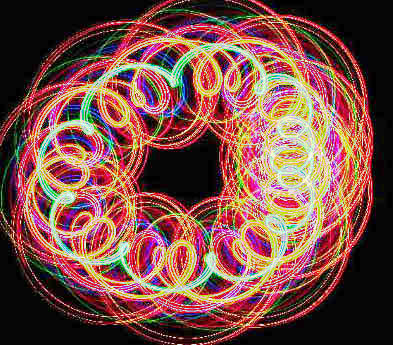 One
fine day, Lucette P., a lady lawyer, a great supporter of our mission
for many
years, now gone to where our last breath will hustle all of us, planned
to
publish The Book (2d part of The
Revelation of Arès) without any bracketed words. One
fine day, Lucette P., a lady lawyer, a great supporter of our mission
for many
years, now gone to where our last breath will hustle all of us, planned
to
publish The Book (2d part of The
Revelation of Arès) without any bracketed words.
She thought
that only what
had entered my ears was true. She had doubts about whatever has entered
my
heart, printed in brackets. In other words, the sound but not the Core
(Rev of Arès xxxiv/6-12).
I replied
to her, "You're acting rationalistic like in the courtroom where the
witness's voice, but not his thought, is heard. During the Theophanies,
1977, I
perceived both, because the Father put me in a state of complete
perception. The
prophet is the one that
perceives
all. She dithered for some time just to save face, and then gave up her
plan.
Lately, I received a few messages to warn me than a Sister Maryse
wanted to publish
The Revelation of Arès without
my
footnotes and commentaries, which she would consider as doctrinaire and
unbearable.
I answered, "My word is
the Word of the Father (Rev of Arès
i/12, xxxi/10), I've got the Wind, I
speak to the brothers as the
Father does not speak to them (xx/12-19)
and the part of the just prophet (35/5, xxxi/10, xxxvii/2)
is
to explain. I have never forced anybody to listen to me and, anyway,
just as
Gamaliel said to the Sanhedrin, "If
my words are just mine, they will destroy themselves, but if they are
God's,
nothing will ever destroy them. Never fight against God (The Acts of
the
Apostles 5/38-39)."
Knowledge... About The Revelation of Arès
do I have the knowledge of It or only a knowledge among others? I have
the
knowledge. I've got it along with the Word.
If I had not, could I be the Justice of
the just one (Rev of Arès xxxi/10)? Nevertheless, some say
that I have got a
knowledge, but that it is debatable, and others say that I have
misunderstood
the knowledge and they correct it. Who can know and what is to know?
Can I in one way or another compel anybody to believe in my
knowledge
without
his agreement? Anybody can say he believes, even if he does not believe
inwardly.
In one way or another again, all of our missionaries know that the
witness to
the only real Master does not
carry very
much weight with the swarming master (Rev
of Arès 18/1-3) of the world, who knows everything, has
understood
everything, shrugs his shoulders or feels outraged while reading The
Revelation of Arès. Not two weeks go
by when I do not receive a letter from a condescending explainer or a
disexplainer. Is this because people do not agree that I say what I say
and do
not come under the control of what all others say? Is this because
people want
the truth to be democratic and be discussed by everybody, even though
endlessly, but never to be given by one head? Is this because every man
wants
to find his way only deep down by himself?
In short, people do not want a single Thought,
but The Revelation of Arès is not a
Thought. It is the Truth,
if that! It is the Truth
that is not, but that could be, if the world
changed (Rev of Arès 28/7) for the better.
In other words, it is the knowledge of what has
to be, but not of what is and may never be if the sin
of sins (38/2) comes up before the change
is made.
The Truth of The
Revelation of Arès is not a correspondence between the speech
and the fact, but it is between the speech and the Design,
the achievement
of which is man's prerogative. It is the exact opposite of religious
dogmas
which can't see God but as the purpose of everything on earth.
Now, The Revelation of Arès sees
man
as the purpose of everything on earth. It is not a knowledge which
solves "the
darkness of the mystery of humans doomed to the freedom of Good
as well as Evil
(Jorge
Semprùn)." It is is just the knowledge of the alternative. The ones who
see it as an absolute knowledge waste their time. The ones who see it
as the logos (reason) have a better
understanding: The Father's reason is that Good
should be preferred to Evil, but he
leaves man free to think of the opposite. His Truth
is not the undisputable privilege of a Master
who punishes his opponents, but it is a free
choice. It is why a Socrates, for instance, might be a prophet
when he insisted he did not know
anything in order to help others think better, just as The
Revelation of Arès does not know where man will go, to Good
or to Evil;
it does nothing but warn that Evil
can lead to greater and greater sufferings, but does not keep
man from preferring them.
All we The Revelation of Arès
missionaries have to do is call on people to prefer Good
by reminding the indifferent or the unconscious
of the
spiritual strength, which any man can awake within himself, if he wants
to bring
out the "powers that do or undo truths (Paul Valéry)", and that the
truth of The Revelation of Arè is
the
best, even if it is neither the only one nor the most convincing today.
Can we thereby
better see that we are not a religion, but a knowledge, the knowledge
of an
alternative still possible, though we don't know how long it will be?
Do the Bible and the Quran give anything but alternatives?
Whatever in
their
contents is not an alternative, but an absolute reward or an absolute
sentence,
has been added by man. To do so the transcriber often had nothing to do
but
change a word or a few words. But God is Mercy,
because He admits that there is such a thing as Evil
and through His Compassion
shows the way to Good as an
alternative. Everybody is struck by how opposite are the sentence "In
the Name of Allah the Merciful, the
Compassionate", which tops every sura, and contents that
proclaim merciless
convictions.
Man is endowed with an autonomous power of choosing, so that
the Word
would get
nothing more even if It would be a kind of masterful absolutist
announce; man
would keep on choosing. In his foreword to "The
Encyclopedia" unbeliever d'Alembert said "Each
man thinks all by himself", unaware that he thereby expressed the real
faith. If
we trod the streets like Evangelists warning that the alternative is
Christ or
Hell, we would be judges, but not
apostles. But, if we were not aware that a small
remnant of penitents will
be
enough to save the world, we would not be better than Evangelists when
we tread
the streets showing two ways: The way to Good,
which will lead mankind to God, even those who do not believe in Him
today, and
the way that Adam has chosen (Rev of Arès
2/1-5), wherever it leads to, and if it leads to the frozen
darkness (16/15, 33/33) or to the sin of sins
(38/2), you can believe me,
people don't give a damn about
it just as a smoker doesn't give a damn the smoke.
Our knowledge gives strength to our faith, through which we will make
the small remnant of penitents
who will save the world, but if it consisted merely in an
argument of propaganda or a highbrow reasoning , let's admit that the
future would not be
guaranteed.
 | Comments
published
(0)
Add a comment
|
|
july
11, 2012 (0132US)
Buddha
| We Arès Pilgrims
are
not Buddhist, but I've got a bone to pick with a friend of my parent,
who had
lived in the Far East, and taught me as a teenager that the Buddhists
were
"pig ignorant numskulls." I used to keep that prejudice as stupid as
summary until 1974-1977.
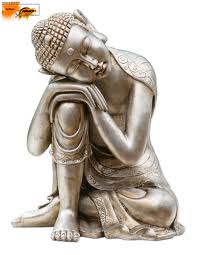
The Revelation of
Arès does
not
mention the Buddha, because he is far away from the
Field that I am allotted to by it (Rev
of Arès 5/5-7), but it has inclined me to think of him as the
first messenger of love, forgiveness,
peace, spiritual intelligence
and
absolute freedom, in other words of
penitence. Not only do I
correct my
prejudice against him in this entry, but also I think that some idea of
his
teaching
comes in handy for my brothers.
It is not easy in only sixty lines—but I'm trying—to sum up the ideas
of a tremendous
complex Buddha,
who lived 2,500 ago. About at the very time Socrates lived in Greece.
Here I
refer to the Theravāda or The Ancients' School or Hinayana Buddhism,
the
Buddha's original teaching at variance with the Mahāyāna, the Great
Vehicle, which was to appear later on, a form of buddhism widely
stepped up
and warped
(religious, theistic and even polytheistic, ceremonial, superstitious)
like
Tibet's Buddhism which is as unlike the Buddha's plain pure teaching as
the
Catholic Church is unlike Jesus' plain pure gospel.
A prince, who was born and raised in the country now called
Nepal,
Siddhattha
(Sidhārta in Sanskrit) Gautama was married with Yasodharā
and had a
son, Rāhula.
When he was
29, he
forsook everyone and everything and went in search not for God and the
salvation of his soul, because he
did
not believe in either, but for a solution to global suffering.
When he
was 35, he found it, sat down under a tree—The Bo tree—and became the
Awekened
one = the Buddha. From now onwards he preached all over India for 45
years. What
did he say?
Man can free himself from all bondages. "Each one is his own refuge."
Each one can reach the nirvāna (see below). Unlike some widespread
opinions
Buddha did not found the sangha (the monastic order) and his knowledge,
which
contained nothing esoteric, was destined to humain from all
backgrounds. The
Buddah's broad-mindedness was so much so that he did not teach a
religion, but much
more: a life wisdom. "Never say I believe, but say I see and I
understand." Saddhā is translated as faith, but it really means
confidence
in correctly understood life. Buddha did not acknowledge that anyone
had a
right to the Truth. He thought that sectarianism and even points of
philosophy
and general knowledge of no straight use to salvation should be
ignored. Hence
the "pig ignorant numskulls" of whom my parents friends used to speak.
At the root of the salutary knowledge he saw Four Noble Truths, in Pali
(the
language of the Buddhist canon): Dukkha, Samudaya (beginning of
dukkha),
Nirodha well-known under the Sanskrit name Nirvāna (end of dukkha),
Magga (the
path that leads to the end of dukkha). Dukkha means "pain", but
Buddha overflowed this meaning widely. Here we broach all that is deep,
invigorating, but undefinablewith words and only definable with
real-life experience
in the Buddhas's teaching. He was neither pessimistic (some see him so,
though)
nor optimistic, but yathāboutam = unbiased. He saw no bliss or
sin which
deserved mens' particular attention; it was better to follow the path
of
perfect freedom and peace through which men can evade dukkha. Dukkha is
an
unclear notion in our languages; it is an untranslatable multipurpose
notion,
because life is not defined as bliss and pain, which are relative and
can be
exceeded : "All that is impermanent is dukkha." What we call
"a being", "an individual" or "the self" is a combination
of strengths physical, menta and continuously changing, which can be
divided
in five aggregates (matter, sensations, perceptions, mental formation,
conscience) which all together are dukkha. Conscience is neither "the
self",
nor
"the soul", nor "the ego", because there no such thing as a
conscience, wich is of many moods, and a man has as many consciences
as there
are conditions of their appearances. All never ends up changing. The
Noble
Truths are very complex, shrewdly psychological in places, so I can't
elaborate
on them now, but anyhow"whoever sees dukkha sees the birth and the
discontinuance
of dukkha and sees the path that leads to the discontinuance of dukkha."
Let's turn our attention to the second Noble Truth: Samudaya, and the
third one:
Nirvāna (in Sanskrit) for a moment.
Samudaya is the birth of dukkha caused by the thirst (tanhā) for greed,
pleasure,
power, etc., of which all the misfortunes of the world are the result.
Here the
concepts of kamma (well-known in Sanskrit as karma) and of re-birth.
Buddha saw
kamma as volition (act of willing) but not the result of the karma,
which
Western reincarnationists put forward. An awakened one can't produce
any karma,
because there is no such thing as the self, therefore running after the
self is
never-ending, and he sets himself free from the thirst for continuity.
An
awakened one never meets rebirth. The kamma or karma is by no means a
process
of moral justice or a play of punishment and reward, but a play of
action and
reaction. A being is just a combination of physical and mental
strengths, said
Buddha. Death is the the stopping of the physical strength,but the will
to
exist is a tremendous power which drives all lives and the whole world
and never
stops acting when the flesh dies and appearing in a lot of other forms
which we
can call rebirths, just as we as terrestrial beings never stop being
born and
then reborn repeatedly, because nothing is permanent. We are far away
from the poor
rudimentary concept of reincarnation that our reincarnationnists have.
According to Buddha there are no such things as a self or a soul
(atman) and the
life strengths keep up acting without any soul. This is a string that
goes on
without ever breaking.
Nirvāna is not translatable, just as dukkah isn't, but its Pali
synonyms :
tanhakkaya: the dying out of the thirst, asamkhata: the unconditioned,
virāga: the
lack of desire, nirodha: cessation, give an idea of its meaning. Buddha
said
that "the nirvāna is the end of the future ,the dying out of desire,
hatred, illusion; this is the absolute. "To be free from vanity, to
kill
thirst, attachment, stop the continuity… It is the non-born, the
non-becoming,
the unconditioned… It is where there are no length or width, nothing
subtle or rough,
no good or evil, no name or form, no coming or leaving, no birth or
death, no
object of feeling can't be found in it." Nirvāna is neither positive
nor
negative, because nothing can render it "just as a fish has no words to
describe what's going on out on the ground." The nirvāna results of
nothing, because if it had a result, it had a cause, it would be
conditioned. ne
résulte de rien, car s'il était un résultat il aurait une cause, il
serait
conditionné. A question like, "What is there after the nirvāna?"
can't be asked, because it is the final Truth. If it is final, nothing
can be
found afterwards. " The nirvāna can be reached in the present life, it
has
no relationship to death… Here we are connected to the Buddha's
tremendous inexpressible
wisdom.
The Buddha's teaching was aimed at everyone, monks as well as common
people,
wherever they lived. Sāriputta, the Buddha's main disciple said that a
man can
live as an ascetic hermit and be impure and that a man can have with a
family
and a job downtown and be pure. Besides, a man that spends his life in
loneliness makes a serious error, because love, compassion and being of
help to
others are fundamental actions, even to monks. "To adore is to carry
out
one's duty towards others."
Buddhism is a way to life; nothing is compulsory in it. It is not a
religion. The
Buddha was a realist and said that, had the material well-being not
been an end
in itself, it was designed and even necessary to promote spiritual
life. He incited
people to economic prospérity, financial help for business and good
wages for
workers. He banned the weapon manufacturing. He advocated confidence
(saddhā) in
the spiritual,ethical, intellectual values, respect for life, charity,
wisdom,
nonviolence. He threw out theft, adultery, lies, drunkenness.
An Arès Pilgrim has probably spotted the points that keep him
off and
those
that bring him close to Buddha. On the one hand, Buddha did not believe
in God or
in the soul. On the other hand, he recommended a way to salvation
similar to the penitence and
did not found any religion. Whoever thinks can see that, if we are not
Buddhist , we all the same are closer to Buddha than to the
pope and its religion and even all religions. Be that as it may, if we
have a good idea of the job we have to do to bring men together closer
to the very simple notion of the Salvation
of individuals and of the world just as The Revelation of Arès
gives it to us in the Field
that it points out to us, we can also see that the Father has made
Buddha prepare the way for the prophet whom He will send beyond our Field.

| Commentaires
Publiés
Ajouter
un commentaire
|
|
june
24, 2012 (0131US)
sanctity
|
 The 2012 Pilgrimage has begun. The 2012 Pilgrimage has begun.
The pilgrim who comes and take the Fire (Rev of Arès xLi/3-7)
says,
You are the only Saint. Let your
Sanctity
prevail over us! (12/4), but does he feel the Sanctity? No. He
can
only live It.
Indoors the pilgrim can see four walls and the roof structure between
which the
Father spoke in 1977? Outdoors he can see trees, hear the world's noise,
breathe air, get the sun by day
and watch the stars by night, but how can he feel the Sanctity?
He cannot,
unless he
changes his life (Rev of Arès 30/11) just
as God changed
His Life when he said to Noah, Never
will I doom the earth because of man (Genesis 8/21).
So Eternity (36/23) and Sanctity
are not horizontality, but
dynamics.
Against the world (Rev of Arès 3/2,
34/1,
etc.), which says that nothing can change beyond the laws of
science (26/3, 28/19, 33/6),
we say that
man can change (30/11) and make the
world change (28/7) so that there
will be neither days, nor nights (31/8),
nor death
(xxxi/4).
May I add that Sanctity is
perfection? It may be so, but perfection can only be made out within a
system
of well-known values and we know almost nothing about God.
We at least are aware that Sanctity
is dynamics, an appearance of Forces
which the Arès Pilgrim picks up.
The first Force
is that of life. No thing such as life without God, neither lower lives
like
that of trees, that of the world's noise,
that of the sun and galaxies, nor higher lives like that which an Arès
Pilgrim comes
close to through penitence: Life (Rév of
Arès 9/6, 24/3-5, 25/3, etc.) that
he chooses as an ideal against the
lower ideal that Adam chose (2/1-5). It
is in and by the higher Life that the
Father
is the Saint par excellence. This
is
why there is no concept of Sanctity but
in Him. He is indeed the only Saint.
We cannot be aware of all the appearances of Sanctity,
but we can say that it appears in the
Burning Bush in front of Moses (1300 before J-C) or in the
Stick
of Light in front of Mikal (Arès,
1977). Take off your sandals, for you
stand on the Saint's ground (Exodus 3/5), says God to Moses.
God puts
between Himself and man a fence that will disappear only through penitence,
The
Reveation of Arès says. The Maker's Soul
has an unimaginable quality, but man can give himself a soul
(Rév d'Arès 17/4) through penitence
and opens himself to the prevalence
of Sanctity, which he will not get
in full until the Day of
resurrection.
Nonetheless, the Creator is the God of the Covenant
(Genèse 15/18), so that he may
not always keep his Sanctity, his
dynamics, to Himself. He
does not always make It an impassable barrier between the divine sphere
and the
human one. He seeks to (re)split It between Him and man just as he
split It
between Him and Adam before Adam would make a wrong choice
(Rév d'Arès 2/1-5), so that He later and even in very hard
times like a quarrel He will appear as
the Saint among the Hebrews (Nombres
20/13). In brief, Sanctity
shows
iself to be active most obviously in miracles.
The link with the Sanctity in
the
Covenant, which we Arès
Pilgrims have
been striving to forge again, a lot of people before us have entered
unto penitence to reforge it
already. This is notably the reason why Isaiah used the name Saint
of Isreal 30 times. And to Hosea (11/9)
the Maker said, I am God and not man, the Saint present
among you ; I will not let the flames consume you.
Because if Sanctity is what
qualifies God to be
God, It is also what makes Him most humane! Distance notwithstanding,
but
because of his Word's invigorating Force,
God is the next of kin, the Father—and even the Mother
(Rev of Arès 33/16-18, 38/3) —of the men with whom He is in
very
close contact.
The Old Testament calls the Ark of the
Covenant, the Temple or
the priests saint or holy, but
that materialized
or humanized sanctity or holiness is not upheld by The
Revelation of Arès. It upholds only the aspiration of the soul,
any soul,
to sanctity, that
man will get on the Day of
resurrection along with his transfigured flesh,
the very flesh that Jesus, who paid
me visits in 1974, has got back already.
We Arès Pilgrims have gone into action against the powers (atheism,
rationalism, etc.) which strive to
dissolve the Sanctity,
the image and likeness of God (Genesis
1/26-27) set securely deep down
each man. Sanctity along with Power and
Light (Rev of Arès 12/4)
constitute
a Whole, but the Father uses three words, because there is not an only
word in
any human language to describe Him. It is towards that Whole, the
invisible Living Saint on the Saint's
Hights, that we are moving on.
 | Commentaires
existants
(0)
Ajouter
un commentaire
|
|
may
26, 2012 (0130US)
mission
| Free (10/10) to
think their lives
you're
making people !
 The
Revelation of Arès says, Many
men will not follow you and meet perdition; some will submit to My Word
and
along with you they will start My Harvest (4/9), for the Sower has gone
past…
His
Seed has passed borne on His Breath right into men's hearts (5/1).
The mission of the penitents or
Arès Pilgrims
therefore does not consist in sowing
or converting, but it consists in harvesting the germinating
or ripening seed (6/4),
the corn ears (13/7, 14/3, 31/6), gathering together (24/1) the men and
women likewise able to enter unto
penitence.
Now, the harvest is encountering
more
and more resistance. Why?
Indifference, unbelief and slanderous enmity make our task difficult,
but they
are permanent features met with by all of prophetic movements ever
since the
beginning of History. To unbelievers and fanatics, old foes of the
liberating Truth, is nowadays added
a negative
force much harder to break through: the dramatic decline of man's
ability to
think. Still, there is no spiritual life, if it is not thought of
before it is
put into practice.
Here is an instance among others of the loss of man's ability to think:
In 2011, the French State wanted to appoint 90 judges by
competitive
examination; the candidates were to be 35 to 50 years old, have an
education
standard of baccalaureate + 4 university years and be capable of being
trained
as judges. The report of the lady president of the board of examiners
is
appalling: "Only 30 persons have passed the exam from 755 candidates
because of their very weak standards. 725 (96 ù) had serious
gaps… [in
particular] proved to be incapable of putting a specific thought into
words,
expressing it correctly, giving rise to some fresh thinking, asking
themselves
about the sense of terms […] Incapable of fitting in a milieu different
from
their own, incapable of answering simple questions, all filled with
pointless
trivial commonplaces." Some candidate did even show "arrogance or
aggressiveness, as they thought that the oral examination was useless
and they
had not to give proof of a certain amount of knowledge …"
The above portrays people with a standard of baccalaureate + 4
university
years, but you missionnary brothers and sisters just think that the
vast
majority of people whom you meet on the street or elsewhere have much
lower
standards! The public you meet is made of casualties of a combination
of
general disappointment and complete lack of education of thought. How
might
that majority of people not be utterly unable to "put a specific
thought
into words" about what you tell them and "answer simple
questions" otherwise than through the rumor that they have gleaned here
and there whenever they have gleaned some?
This is the strongest obstacle: The complete incapacity of people to
draw up a
valuable idea of themsleves, of their environment and their destiny.
The swing to
animality — the sin of sins (38/2) —is
quickening.
Why can they
no
longer think? Because they are unknowingly no longer free to do so.
There is no such thing as reincarnation in a rough meaning of
a return
of
immortal souls into new bodies (Rév
d'Arès v/1-2), but in a figurative sense, in a meaning of
tranfer of penitence from a human
being to another
and from the latter to another and so on, talking of reincarnation of penitence is a way of explaining our
mission.
Our misson raises the problem of the existentialism of the Aresian
faith. This
is the only means of making salvation
solvable again after the obvious failure of religions, which have done
nothing
but made common life religious and which are vanishing gradually
therefore. To
religion the terrestrial course has been more important than the
spiritual
destination; religion pays dearly for this error.
Our Aresian faith brings in the opposite: Man can live as a penitent with no visible change in his
everyday life, but the invisible opportunities of his penitence
are very high.
Salvation
will be the end of a long series of complete inward transformations of
human
beings through the continuous reincarnations of penitence.
But why has the world become unable to express a specific idea
of its
destiny? By the way, is it really unable to do so? Isn't it rather kept
from asking
questions that have no answer so much so that it has ended up believing
that there
is no answer, at all. Therefore, it passes us street missionaries and
can't see
that we have had the answer, yes, we've had it.
In "L'Homme
Révolté" (The
Rebelling Man) Albert Camus says that permanent protest is all that
enables man
to give back the rights to life in the middle of the mass conformity.:
"Each rebellion is nostalgia for innocence, a call toward the being." Penitence is an invisible peaceful way
of protesting permanently, it
is the only means of transcending the shackles of time.
 | Comments
Published
(0)
Add
a comment
|
|
|
|
| pages
: 1 2 3
4
5
6
7
8
9 10...suivantes |





























 While I was in
Paris doing
While I was in
Paris doing


 The Revelation of Arès
concludes by saying :
The Revelation of Arès
concludes by saying : One
fine day, Lucette P., a lady lawyer, a great supporter of our mission
for many
years, now gone to where our last breath will hustle all of us, planned
to
publish The Book (2d part of The
Revelation of Arès) without any bracketed words.
One
fine day, Lucette P., a lady lawyer, a great supporter of our mission
for many
years, now gone to where our last breath will hustle all of us, planned
to
publish The Book (2d part of The
Revelation of Arès) without any bracketed words.
 The 2012 Pilgrimage has begun.
The 2012 Pilgrimage has begun.